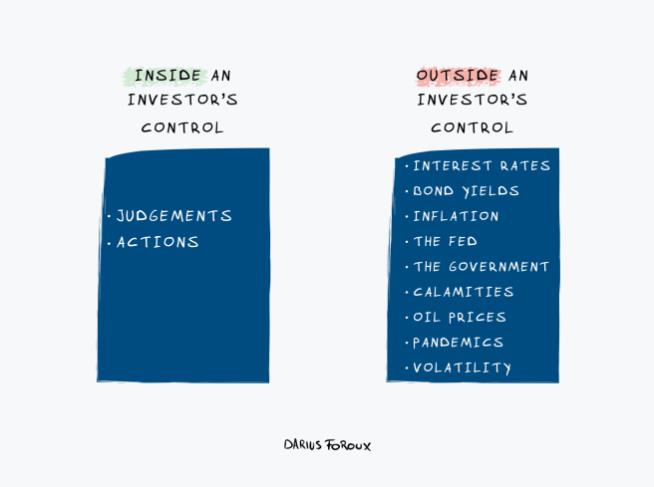
Resources:
https://awealthofcommonsense.com/2013/08/ignore-noise/
https://podcasts.apple.com/us/podcast/stay-wealthy-retirement-show/id1260181429?i=1000470057040
The Narrative
There’s a lot going on...in the past few years; Covid, Stock Market stress, impending recession, inflation, politics...crypto collapse???
Our audience is especially vulnerable to information (news) overload: Traveling; downtime pick up the phone and review news, talk about it during the 3-hour flight, TV on in the hotel room, gym, etc.
Where is the balance?
What is the truth?
Why does this matter – Why does the news and/or events make me angry.
• Being disrespected or treated unfairly?
o Examples? Higher taxes, wealth re-distribution
• Fear...threatened, violated, offended?
o Is my preferred way of life at risk?
• Being interrupted when you are trying to achieve a goal
o Retirement???
• Feeling powerless...
o Loss of control
o Can’t control the short-term gyrations of the market.
o Uncertainty is a feeling of powerlessness...
Example of uncertainty:
All issues are about a million times more complex than we’d like to believe. We search for simplicity to help us cope and explain things. We hate uncertainty.
Loss of control:
About Darius Foroux

Does Social Media Leave You Feeling Angry? That Might Be Intentional
September 13, 2022 - New York Times reporter Max Fisher took a deep dive into the impact of social media in his book, "The Chaos Machine: The Inside Story of How Social Media Rewired Our Minds and Our World." He shares with us how platform leaders have prioritized profit and growth over safeguards and how the polarizing effect of social media is only speeding up.
Serenityrecovery.org
Neurobiology & Anger
In the moment anger feels good. It’s so powerful that it overrides our rational and moral frameworks we’ve established because it comes from our primordial, original limbic system: the center of the brain – where our most automatic emotions like fight or flight originate. This response system controls adrenaline, heart rate, alertness, and other instincts that prepare you for battle or a quick escape. Similar to other addictions like gambling, extreme sports, or even drugs like cocaine the brain releases a dopamine reward when you’re angry which clouds your judgment and can lead to terrifying consequences.
Anger & the Ego
Anger can often times be triggered by underlying feelings of weakness or insecurity. Anger is an easy way to feel powerful and get attention in the moment and overcome feelings of inadequacy. It also gives you a feeling of being in control of things that in reality you don’t have control over. The sad irony is when anger takes over, not only do you not have control of the things making you angry, you’ve also lost control of yourself. The cycle continues because it damages you in the eyes of the people who you want to connect with most which just adds to your ego insecurities.
So what do we do to tune out the noise and be happy?
Guard your mind!
“A man is but the product of his thoughts. What he thinks, he becomes.” Ghandi “I will not let anyone walk through my mind with their dirty feet.”
What do we do?
1. Know the science.
a. Knowing what drives your emotions
b. Investment academic research
2. Maintain A/C control...Focus on what really matters in your life. Focus on what you can control and realize there is a lot you cannot control.
3. Be a long-term investor...in all aspects of life.
4. Prepare for the inevitable:
a. “Chairfly”
b. Planning
• Know the source and the motivation of the source of the information
you’re taking in...
o Read the financial news to take the emotion out of it.
• How to avoid making decisions based on the noise?
o From the book Decisive: How to make better choices in life and in
work. Chip and Dan Heath.
▪ Normal decision process in four steps:
• You encounter a choice. But narrow framing makes you miss options.
• You analyze your options. But the confirmation bias leads you to gather self-serving information.
• You make a choice. But short-term emotion will often tempt you to make the wrong one.
• Then you live with it. But you’ll often be overconfident about how the future will unfold.